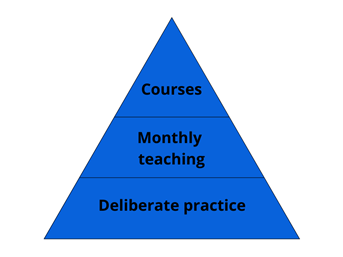Trainee information
What is the simulation strategy?
Simulation-based medical education is a proven methodology for delivery of surgical training. It is particularly effective in the development and refinement of practical skills, decision making and teamworking skills.
A new general surgical curriculum for high specialty trainees launched in August 2021; this was created in response to the Shape of Training Review. It includes recommendations for the use of simulation-based training as part of a blended learning approach for higher surgical training, building on the principles adopted for the Scottish Improving Surgical Training pilot for core surgical trainees.
The strategy has been prepared by the Scottish Surgical Simulation Collaborative with consultation with the Scottish Training Programme Directors (TPDs), Surgical Specialty Training Board (STB), Association of Surgeons in Training (ASiT) and the NES Medical Simulation Collaborative.
The strategy aims to build on the same principles set-out in the Scottish Improving Surgical Training pilot. This has been focussed on developing a culture of regular personal, in-house simulation-based training, addition of simulation to existing monthly teaching programmes and occasional courses; including an enhanced induction ‘Bootcamp’. This strategy recognises the need for repetitive deliberate practice of skills with feedback as the foundation to developing and enhancing skills.

Training will be split over 3 phases:
The aim of the simulation programme is to:

This page was last updated on: 18.08.2023 at 10.56